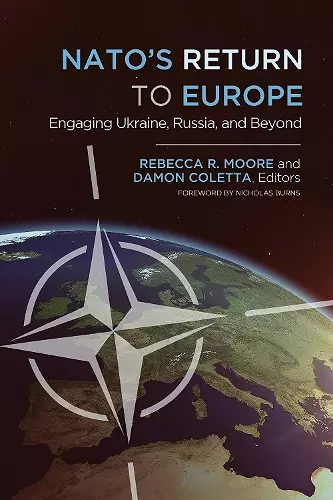NATO's Return to Europe
Engaging Ukraine, Russia, and Beyond
Rebecca R Moore editor Damon Coletta editor
Format:Hardback
Publisher:Georgetown University Press
Published:11th Sep '17
Currently unavailable, and unfortunately no date known when it will be back
This hardback is available in another edition too:
- Paperback£29.50(9781626164888)

Rebecca Moore and Damon Coletta have edited an important and timely collection of studies on the challenges confronting NATO in the wake of Russian intervention in Ukraine. They have drawn on the expertise of seasoned NATO scholars. Their product deserves the close attention of policy makers and reachers of international relations. -- Lawrence S. Kaplan, Emeritus Director of the Lyman L. Lemnitzer Center for NATO Studies, Kent State University Even those skeptical of NATO's push east will find much value in this excellent compendium of essays on the contemporary challenges facing the alliance. -- David Hendrickson, , Colorado College This remarkable collection of original essays by accomplished scholars offers a timely, perceptive, and thought-provoking survey of the challenges facing NATO. Russia's annexation of Crimea and continuing intervention in Ukraine have led the NATO Allies to renew their commitment to collective defense and deterrence and to reassess their other core tasks of crisis management and cooperative security. -- David S. Yost, Naval Postgraduate School
NATO's 2010 Strategic Concept officially broadened the alliance's mission beyond collective defense, reflecting a peaceful Europe and changes in alliance activities. NATO had become an international security facilitator, a crisis-manager even outside Europe, and a liberal democratic club as much as a mutual-defense organization. However, Russia's re-entry into great power politics has changed NATO's strategic calculus. Russia's aggressive annexation of Crimea in 2014 and its ongoing military support for Ukrainian separatists dramatically altered the strategic environment and called into question the liberal European security order. States bordering Russia, many of which are now NATO members, are worried, and the alliance is divided over assessments of Russia's behavior. Against the backdrop of Russia's new assertiveness, an international group of scholars examines a broad range of issues in the interest of not only explaining recent alliance developments but also making recommendations about critical choices confronting the NATO allies. While a renewed emphasis on collective defense is clearly a priority, this volume's contributors caution against an overcorrection, which would leave the alliance too inwardly focused, play into Russia's hand, and exacerbate regional fault lines always just below the surface at NATO. This volume places rapid-fire events in theoretical perspective and will be useful to foreign policy students, scholars, and practitioners alike.
Delivers a very robust and updated overview of the Alliance's current strategic situation. . . . Should be of great value and interest both for practitioners and students of transatlantic relations. * Parameters *
ISBN: 9781626164871
Dimensions: unknown
Weight: 599g
290 pages